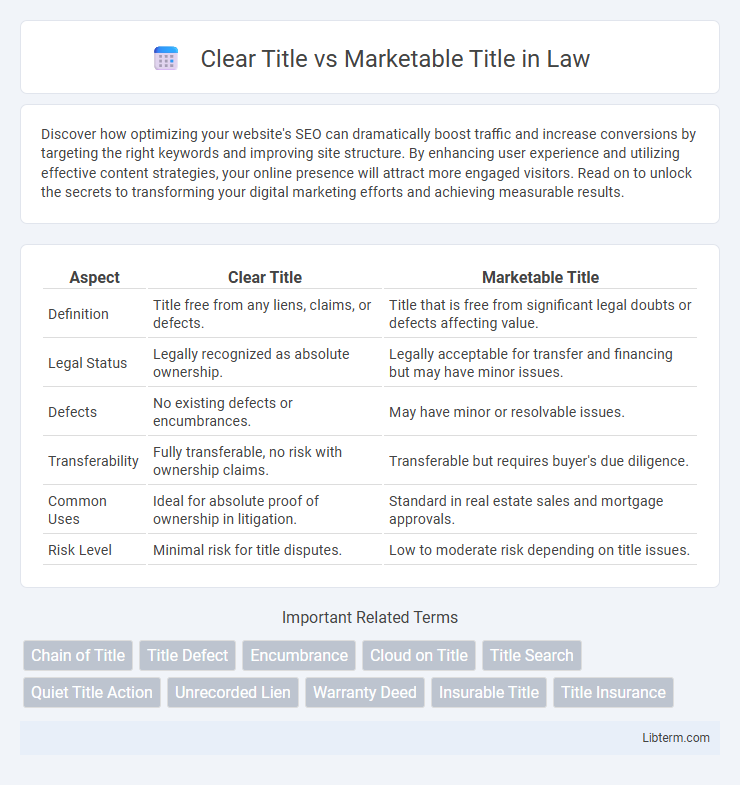Discover how optimizing your website's SEO can dramatically boost traffic and increase conversions by targeting the right keywords and improving site structure. By enhancing user experience and utilizing effective content strategies, your online presence will attract more engaged visitors. Read on to unlock the secrets to transforming your digital marketing efforts and achieving measurable results.
Table of Comparison
| Aspect | Clear Title | Marketable Title |
|---|---|---|
| Definition | Title free from any liens, claims, or defects. | Title that is free from significant legal doubts or defects affecting value. |
| Legal Status | Legally recognized as absolute ownership. | Legally acceptable for transfer and financing but may have minor issues. |
| Defects | No existing defects or encumbrances. | May have minor or resolvable issues. |
| Transferability | Fully transferable, no risk with ownership claims. | Transferable but requires buyer's due diligence. |
| Common Uses | Ideal for absolute proof of ownership in litigation. | Standard in real estate sales and mortgage approvals. |
| Risk Level | Minimal risk for title disputes. | Low to moderate risk depending on title issues. |
Understanding the Basics: Clear Title vs Marketable Title
A clear title refers to property ownership free of liens, disputes, or legal encumbrances, ensuring undisputed ownership rights. Marketable title not only is clear but also meets legal standards making the property easily sellable and insurable without risk of litigation. Understanding the distinction is crucial for buyers and sellers to confirm the property's transferability and financial security.
Legal Definitions of Clear and Marketable Title
Clear title is legally defined as a property title free from liens, encumbrances, or disputes, ensuring undisputed ownership rights. Marketable title extends this definition, requiring the title to be free from any defects that could impair its sale or transferability to a reasonable buyer. Both legal definitions emphasize the absence of legal defects, but marketable title specifically guarantees that the property can be sold without future legal challenges.
Key Differences Between Clear Title and Marketable Title
Clear title guarantees absolute ownership without liens, claims, or encumbrances, ensuring the property can be sold without legal issues. Marketable title indicates the title is free from significant defects or disputes, making it acceptable to a reasonable buyer and lender for transaction purposes. The key difference lies in clear title's absolute proof of ownership versus marketable title's assurance of reasonable acceptability in real estate transactions.
Importance of Title Clarity in Real Estate Transactions
Title clarity is crucial in real estate transactions because a clear title ensures the property is free from liens, disputes, or legal encumbrances, providing buyers with confidence and security. A clear title differs from a marketable title in that the latter must be free of significant defects and acceptable to a prudent buyer or lender, guaranteeing smooth ownership transfer. Ensuring title clarity reduces the risk of future litigation and financial loss while facilitating lender approval and seamless transaction closures.
Common Issues Affecting Title Marketability
Common issues affecting title marketability include outstanding liens, unresolved encumbrances, restrictive covenants, and boundary disputes that cloud ownership clarity. Clear titles typically lack these defects, ensuring the owner's full legal rights and transferability without encumbrances. Title marketability ensures the property can be sold or financed without legal challenges stemming from hidden claims or disputes.
Title Searches: Ensuring Clear and Marketable Title
Title searches play a crucial role in ensuring clear and marketable title by thoroughly examining public records to identify any liens, encumbrances, or defects affecting property ownership. A clear title confirms the absence of legal obstacles, while a marketable title guarantees the property can be sold or mortgaged without dispute. Comprehensive title searches help safeguard buyers and lenders from potential legal claims, ensuring smooth real estate transactions.
Legal Implications of Defective Titles
Defective titles can lead to significant legal disputes, including litigation over ownership rights and financial losses for both buyers and sellers. A clear title guarantees that the property is free from liens, encumbrances, or legal claims, ensuring marketability and smooth transfer of ownership. In contrast, a marketable title may have minor defects but must be sufficient to convince a reasonable buyer of the property's legitimacy, limiting exposure to legal challenges.
How Title Insurance Protects Buyers and Sellers
Title insurance protects buyers and sellers by safeguarding against financial loss due to defects in Clear Title or Marketable Title, such as undiscovered liens, encumbrances, or ownership disputes. Marketable Title guarantees ownership free of significant legal questions, while Clear Title confirms no cloud exists on the ownership record, both essential for secure transactions. Title insurance ensures compensation if title defects surface post-sale, providing crucial risk management in real estate purchases and sales.
Resolving Title Disputes and Defects
Clear title refers to ownership of real property free from any liens, encumbrances, or legal disputes, making it essential for a smooth transaction. Marketable title ensures the title is free from significant defects or claims that could result in litigation or ownership challenges, providing buyers with confidence. Resolving title disputes and defects typically involves title searches, obtaining title insurance, or legal actions like quiet title lawsuits to confirm or restore clear and marketable ownership rights.
Best Practices for Securing a Marketable Title
Securing a marketable title requires thorough title searches and resolving any outstanding liens or encumbrances to ensure the property is free from legal defects. Conducting a comprehensive title examination with the help of a reputable title company helps uncover hidden issues like unpaid taxes, judgments, or claims. Implementing title insurance provides an added layer of protection against future disputes, safeguarding both buyers and lenders in real estate transactions.
Clear Title Infographic

 libterm.com
libterm.com